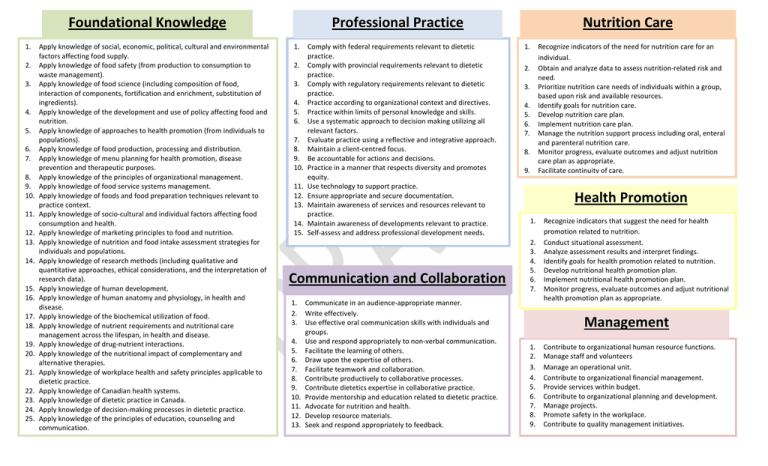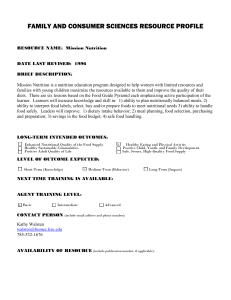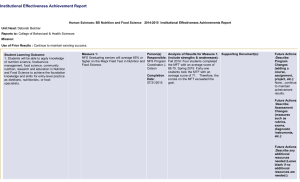Foundational Knowledge Professional Practice Communication and
advertisement

Foundational Knowledge 1. 2. 3. 4. 5. 6. 7. 8. 9. 10. 11. 12. 13. 14. 15. 16. 17. 18. 19. 20. 21. 22. 23. 24. 25. Apply knowledge of social, economic, political, cultural and environmental factors affecting food supply. Apply knowledge of food safety (from production to consumption to waste management). Apply knowledge of food science (including composition of food, interaction of components, fortification and enrichment, substitution of ingredients). Apply knowledge of the development and use of policy affecting food and nutrition. Apply knowledge of approaches to health promotion (from individuals to populations). Apply knowledge of food production, processing and distribution. Apply knowledge of menu planning for health promotion, disease prevention and therapeutic purposes. Apply knowledge of the principles of organizational management. Apply knowledge of food service systems management. Apply knowledge of foods and food preparation techniques relevant to practice context. Apply knowledge of socio-cultural and individual factors affecting food consumption and health. Apply knowledge of marketing principles to food and nutrition. Apply knowledge of nutrition and food intake assessment strategies for individuals and populations. Apply knowledge of research methods (including qualitative and quantitative approaches, ethical considerations, and the interpretation of research data). Apply knowledge of human development. Apply knowledge of human anatomy and physiology, in health and disease. Apply knowledge of the biochemical utilization of food. Apply knowledge of nutrient requirements and nutritional care management across the lifespan, in health and disease. Apply knowledge of drug-nutrient interactions. Apply knowledge of the nutritional impact of complementary and alternative therapies. Apply knowledge of workplace health and safety principles applicable to dietetic practice. Apply knowledge of Canadian health systems. Apply knowledge of dietetic practice in Canada. Apply knowledge of decision-making processes in dietetic practice. Apply knowledge of the principles of education, counseling and communication. Professional Practice 1. 2. 3. 4. 5. 6. 7. 8. 9. 10. 11. 12. 13. 14. 15. Comply with federal requirements relevant to dietetic practice. Comply with provincial requirements relevant to dietetic practice. Comply with regulatory requirements relevant to dietetic practice. Practice according to organizational context and directives. Practice within limits of personal knowledge and skills. Use a systematic approach to decision making utilizing all relevant factors. Evaluate practice using a reflective and integrative approach. Maintain a client-centred focus. Be accountable for actions and decisions. Practice in a manner that respects diversity and promotes equity. Use technology to support practice. Ensure appropriate and secure documentation. Maintain awareness of services and resources relevant to practice. Maintain awareness of developments relevant to practice. Self-assess and address professional development needs. Communication and Collaboration 1. 2. 3. 4. 5. 6. 7. 8. 9. 10. 11. 12. 13. Communicate in an audience-appropriate manner. Write effectively. Use effective oral communication skills with individuals and groups. Use and respond appropriately to non-verbal communication. Facilitate the learning of others. Draw upon the expertise of others. Facilitate teamwork and collaboration. Contribute productively to collaborative processes. Contribute dietetics expertise in collaborative practice. Provide mentorship and education related to dietetic practice. Advocate for nutrition and health. Develop resource materials. Seek and respond appropriately to feedback. Nutrition Care 1. Recognize indicators of the need for nutrition care for an individual. Obtain and analyze data to assess nutrition-related risk and need. Prioritize nutrition care needs of individuals within a group, based upon risk and available resources. Identify goals for nutrition care. Develop nutrition care plan. Implement nutrition care plan. Manage the nutrition support process including oral, enteral and parenteral nutrition care. Monitor progress, evaluate outcomes and adjust nutrition care plan as appropriate. Facilitate continuity of care. 2. 3. 4. 5. 6. 7. 8. 9. Health Promotion 1. 2. 3. 4. 5. 6. 7. Recognize indicators that suggest the need for health promotion related to nutrition. Conduct situational assessment. Analyze assessment results and interpret findings. Identify goals for health promotion related to nutrition. Develop nutritional health promotion plan. Implement nutritional health promotion plan. Monitor progress, evaluate outcomes and adjust nutritional health promotion plan as appropriate. Management 1. 2. 3. 4. 5. 6. 7. 8. 9. Contribute to organizational human resource functions. Manage staff and volunteers Manage an operational unit. Contribute to organizational financial management. Provide services within budget. Contribute to organizational planning and development. Manage projects. Promote safety in the workplace. Contribute to quality management initiatives.



